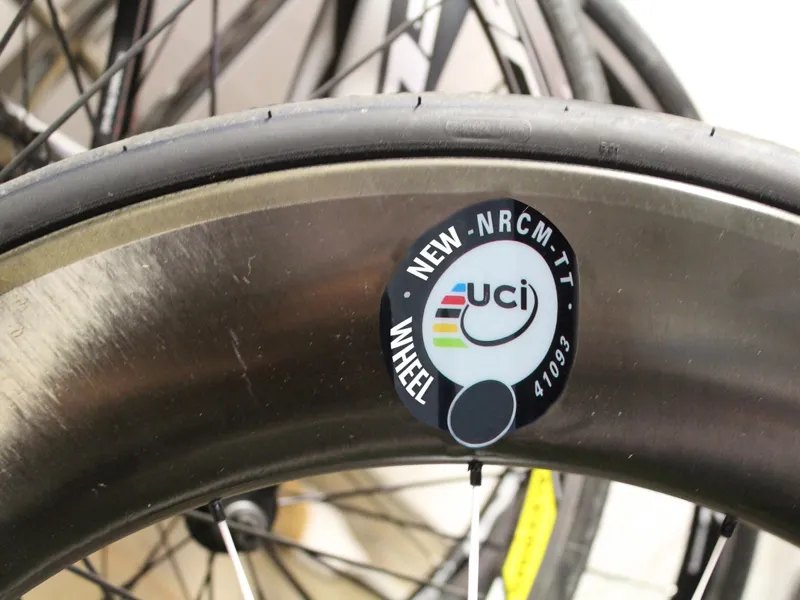Professional cycling's governing body, the UCI, is overhauling its wheel testing program for 2014, with new protocols and mandatory approval stickers.
In 2011, the UCI began a frame approval program that requires all framesets used in elite competition to be approved by the Switzerland-based organization. Under the auspices of safety and fair play, it charges each company a fee for each bike submitted for approval.
Combined with a rule that specifies that these stickers be placed under the frame's clearcoat, the end result for everyday amateur riders is that many of our bikes have UCI stickers on them. The same could soon apply to our wheels.
BikeRadar spoke with UCI technical co-ordinator Matthieu Mottet and representatives from several wheel companies about what this in-development approval program could mean for the wheels ridden by professionals and those available for sale to enthusiasts.
"The new procedure is for January 2014,and this homologation will be mandatory for all wheels used in race only," Mottet told BikeRadar, explaining that the new procedure is an update of a current test. "All approved wheels will receive a label to confirm that they are allowed in races. The control for the commissaires will be easier."
Accoding to Reynolds Composites' Paul Lew, the new protocol could actually have some merit, whereas the current test is not worth much.

Coming soon to UCI racing – approval stickers for wheels
The UCI wheel committee, which consists of UCI officials and wheel company representatives, recently met in Aigle, Switzerland, to discuss the new testing standard.
"The UCI crash test, which wheels are all required to pass now, came about because of the old Spinergy," Lew said, referring to the eight-spoke carbon wheels that could shatter and send shards flying in a hard crash. The current test seeks to determine whether pieces can explode out from a crashed wheel, but doesn't really test for the safety or construction of a functioning wheel, Lew said.
"We, as wheel companies, asked, is this appropriate? A group of manufacturers recommended that the test be modified. The UCI has been very accepting and even co-operative, asking for input," he said. "We understand that, as manufacturers, a stiff wheel is a good wheel. But the UCI could make something out of newspaper and it would be a good wheel, according to the current test."
"One other thing discussed was the loophole for handbuilt wheels," Lew said. "If you're a brand, you’re required to pass this test. However, if you are a wheel-builder, you can assemble wheels and give them to a team, and the team can ride the wheels. Production models have to be tested, but not custom wheels. That regulation is likely changing."
Finally, the committee decided to deal with all spokes the same way, Lew said, instead of having two different standards for metal and carbon fiber.
Representatives from other wheel companies said they hope the UCI will not hinder new technology with any new regulations. "Mavic has a good relationship with the UCI," said Zack Vestal, Mavic's communication manager. "They're just across the border, 40 or 50km from the Annecy Design Center, so it's easy for Mavic product developers to visit with the UCI and discuss regulations or potential issues.
"If anything, a UCI approval sticker can only be good for Mavic, because our products are already heavily tested to withstand significant abuse. Like any other manufacturer, we would hope the UCI's technical regulations foster innovation, rather than stifling development of new ideas."
A Shimano representative who wished to remain anonymous said that the Japanese company is involved in the UCI discussions, which are "headed in the right direction".
At Campagnolo, press manager Joshua Riddle echoed Mavic's sentiment on UCI testing: "As was stated in the meeting by most of the industry’s wheel producers, the need for wheel testing isn’t immediately apparent, as data regarding wheel failure hasn’t shown problems in the market.
"It won't affect the way Campagnolo produces wheels, as we hold ourselves to very strict standards. We have invested heavily in our own testing facility and put painstaking effort into testing each and every aspect of both current wheels as well as new wheels that we plan to release.
"We also test heavily in real world circumstances, well before products are even tested with our athletes. With such a heavy emphasis on quality control and product integrity, it is difficult to foresee how an outside agency could improve on what we are already dedicated on guaranteeing: safety, quality and performance."
Still, Reynolds' Lew remains hopeful about the new regulations, based on the fact that the UCI is requesting input instead of just handing down mandates from on high.
"We don't want arbitrary decisions from the UCI," Lew said. "We want them to be based in real world safety concerns. Now the UCI is listening to us, and this is a big change."
